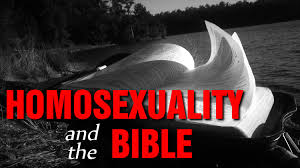01. The Bible and Homosexuality Summary of “Clobber Verses”

There are selected passages in the Bible that lean toward a negative and prohibitive stance on homo-erotic behavior as it was understood within the social context of antiquity, but these passages reflect nothing on the lives of gays, lesbians, bisexuals, and transgendered people today. The word homosexual doesn’t appear anywhere in ancient Greek or Hebrew biblical manuscripts as the word and concept were non-existent in antiquity. The same is true for the words sodomy and Sodomite (unless in direct reference to a resident of the city). There is no passage that condemns gays and lesbians, none that argue for the prohibition of GLBTQ from membership in the body of Christ, none that prevents GLBTQ people from being ordained into Christian ministry and none that negates the validity, worth and right of GLBTQ relationships.
When we refer to the conversation between the Bible and Homosexuality we need to be clear that the entire Bible isn’t engaged in the conversation but that the entire arsenal of Scripture that comprises the offensive of those who proclaim a Biblical condemnation of homosexuality amounts to 5-7 passages in total while the rest of the Bible is ignored. These 5-7 passages are known by most GLBTQ Christians as the Clobber Passages. Clobber is defined in the American Heritage Dictionary,
“to utterly defeat someone, to deal with someone harshly,
to strike violently and repeatedly; batter or maul.”
Synonyms for clobber include assault, pound, pummel, smash, attack, annihilate, crush, overpower, overwhelm, massacre, vanquish.
Is it any wonder these passages are also known as the Texts of Terror and yet the Bible was never intended for this purpose; to break the heart and soul of humanity, or to cause people to run in fear from the Christian faith and from those who were at one time their brothers and sisters in Christ. To wield the Bible for oppression or to make an outcast of another corrupts the life and spirit of the Word. There’s another way and another message; the message of the Gospel and of grace.
SUMMARY NOTES ON THE CLOBBER PASSAGES
1. The intention of the Creation Story in Genesis 1 and 2 was to explain the origin of the world, God’s relationship with humanity, and God’s special relationship with the nation of Israel. In Adam and Eve a norm for relationships is seen in Adam and Eve but this one variety of relationship is not held up as normative for all relationships. Read more …
2. The story of Sodom in Genesis 19 recounts an instance of an attempted gang rape by an entire community of male citizens against two strangers within their gates. The sins of Sodom are provided throughout the biblical witness in both the Old and New Testaments with no mention of that sin being homosexuality. Read more …
3. The Holiness Code, including Leviticus 18:19-22 and 20:1-18, is concerned with keeping the Israelites a distinctive and separate people following their freedom from slavery as they began to inhabitant other lands with other people. The Holiness Code was written for a particular people at a particular time for a particular reason and was never intended to be universally applied across all times and to all people. Read more …
4. In Romans 1, Paul addresses the origin and consequences of idolatry within the Gentile nation. As ‘the pagan’ Gentiles gave themselves up to idolatry, in turn God gave them up to same sex passions and acts as a penalty for their idolatry. The entire chapter is devoted to the progression of their sinful state beginning with idolatry and leading to a people filled with all wicknedess who were ruthless, faithless, murderous, malicious and God-haters. Romans 1 doesn’t apply to GLBTQ people individually nor as a group and to remove Romans 1:24-28 from the context of the entire chapter in an attempt to make a case against homosexuality comes at the cost of dishonoring the Biblical text. Read more …
5. The similar lists of vices (sins) in I Corinthians 6:9 and I Timothy 1:9-10 don’t contain the word homosexual in any ancient manuscripts of the Bible or in any translations prior to the 20th century. The words that have been mistranslated to infer male homosexuality include Arsenokoites and Malakos. There is no reliable historic certainty on the word Arsenkoites as there’s no recorded appearance of the word prior to Paul’s usage and contemporary with and after Paul, appears only in lists of other vices and not within context where a definition can be exacted. Malakos was a common word used to describe one who was soft in character or effeminate. While this could apply to men who were thought to assume the feminine role in a sexual encounter with another man, it also applied to men who bathed too often, enjoy gourmet food, laughed frequently or had a smaller bone structure. There were many words accessible to Paul to describe homo-erotic acts which he never used. Read more …
If you’re one who’s struggling to reconcile your faith and sexuality, don’t limit your examination of the Scriptures to the Clobber Passages alone but reflect on all the Word. If there was a time you once found hope and assurance in the words of Scripture, if there was a time when the Word was a lamp to your feet and a light to your path, if you ever read a Psalm and found comfort or were challenged to stand bold in your faith through the writings of Paul, nothing has changed. The Word still speaks to you. Leviticus 18 or Romans 1 don’t define you. I Corinthians 6:9 doesn’t condemn you. You are today what you have always been; a beloved child of God.
Next Article: 02. Adam and Eve and Steve: Genesis 1 and 2
©2010 Anita Cadonau-Huseby. All rights reserved.
Used with Permission and Much Gratitude